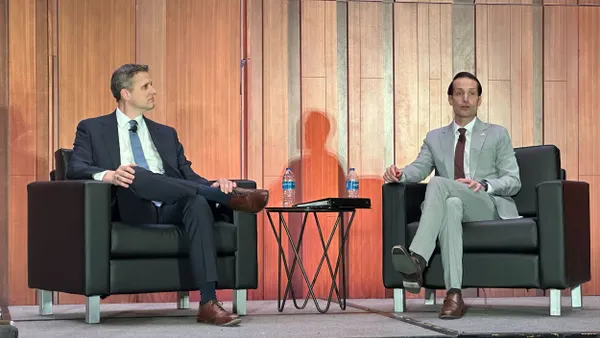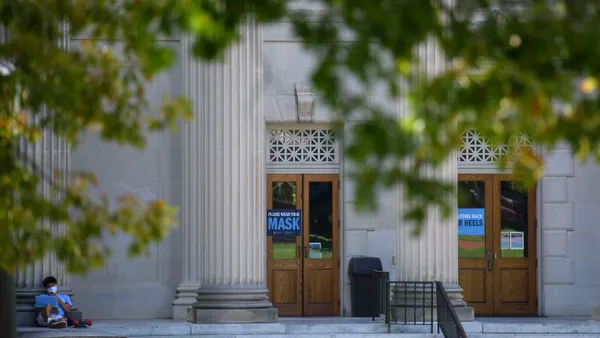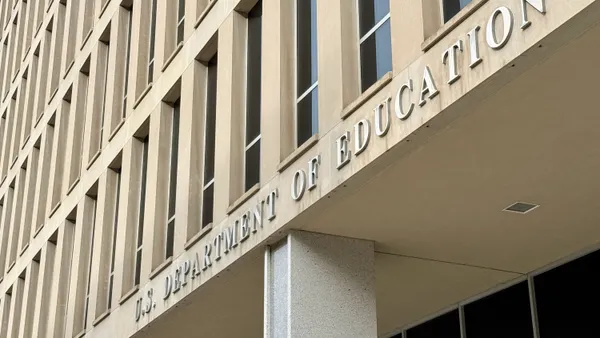Dive Brief:
- DePaul University is mulling a suite of budget measures amid several financial challenges, including a collapse in international enrollment, senior leaders of the Chicago private nonprofit said in a community message last week.
- To save costs, DePaul is considering trimming executive pay, freezing staff and slowing faculty hiring, and limiting discretionary spending, senior leaders said. They also hinted the university could cut academic courses and reevaluate the size of its staff and administration.
- In the fall quarter, new international graduate student enrollment at DePaul fell by 62% year over year, while overall international enrollment declined by 755 students. Officials attributed this to “challenges to the visa system” and “declining desire for international students to study in the U.S.”
Dive Insight:
Going into the fall, several higher education experts raised alarms about the potential impact on international enrollment from the Trump administration’s aggressive tactics to slow immigration and tighten visa policies.
A report this summer, from NAFSA: Association of International Educators, warned that fall international enrollment at U.S. colleges could dip by 150,000 students given slowdowns in visa processing and federal travel bans.
Such a drop would bring a big financial hit. A 15% decline in overall international enrollment would translate into a loss of $7 billion in revenue and 60,000 higher ed jobs, according to NAFSA.
A July report from Moody’s likewise flagged potential financial repercussions for colleges caused by visa disruptions, scrutiny of social media accounts, changes to deportation rules and recent travel bans under the Trump administration. The new policies were “diminishing the perception of the US as a prime destination for higher education,” analysts with the credit rating agency said.
DePaul’s experience is showing that, at least for some institutions, the predictions are bearing out.
“We are seeing massive disruptions to our enrollments in many areas around the university,” President Robert Manuel, Provost Salma Ghanem and Chief Financial Officer Sherri Sidler said in their message last week. “Our FY26 budget planning did not anticipate a reduction of this magnitude.”
A decline in international students can have an outsized impact on a college's finances, given that they typically pay full tuition. In fall 2023, 2,386 DePaul’s students — 11% of its total enrollment — weren’t native to the U.S, according to federal data.
DePaul has other fiscal woes as well. Overall continuing undergraduate enrollment has declined by about 300 students compared to last year, senior officials said.
They also noted that financial need has increased among their students, putting more pressure on the university to issue student aid. For the current fiscal year, institutional aid is estimated to cost $7 million above budgeted levels, they said.
Healthcare costs for university employees — a common pinch point for colleges — also outpaced DePaul's budget expectations. Over the past five years, those costs have increased by nearly $23 million.
“With revenues down and expenses rising, we must act immediately to reduce spending in our current operating budget to meet our financial obligations,” Manuel, Ghanem and Sidler said.
In fiscal 2024, DePaul reported a total operating surplus of $16.6 million, a substantial improvement over an $11.1 million deficit the year before. In recent years its enrollment has declined, though not as significant as many of its peers in the private nonprofit world. Between 2018 and 2023, fall headcount declined by 4.9% to 21,348 students.
In their message last week, DePaul officials noted that first-year and transfer enrollments were performing well and generating revenue gains, though not enough to offset the steep declines in international enrollment.















